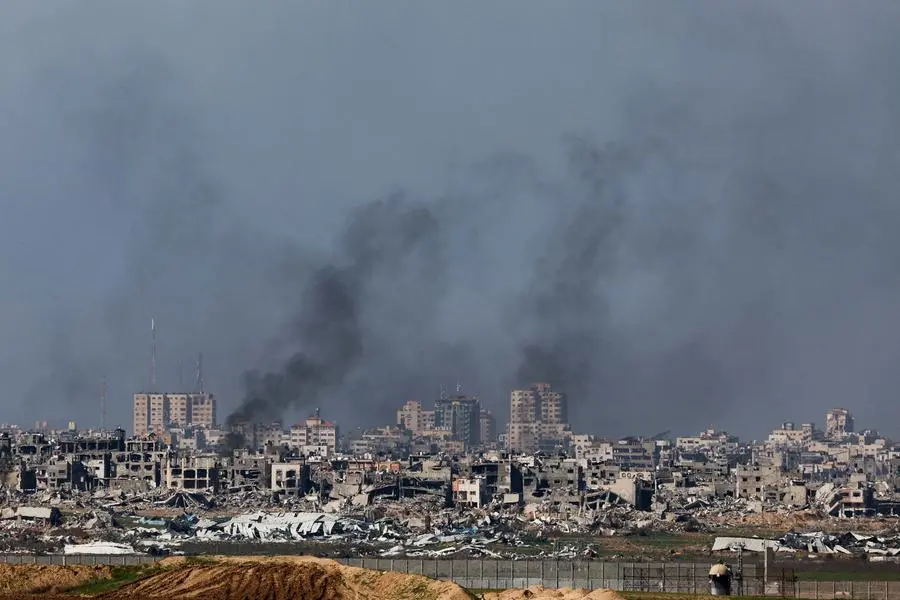PHOTO
Missile attacks in Syria, Lebanon, Iraq and Yemen on Saturday threw into sharp focus the increasing risk of the war in Gaza triggering a wider regional conflict pitting Iran and its allies against Israel and the United States.
Iran said five of its Revolutionary Guards were killed in a missile strike on a house in Damascus which it blamed on Israel, and security sources in Lebanon said an Israeli strike there killed a member of Iran-backed Hezbollah.
Later on Saturday, missiles and rockets launched by Iran-backed militants in Iraq, where such groups have targeted U.S. forces, hit al-Asad air base, the U.S. Central Command said. A number of U.S. personnel were being evaluated for traumatic brain injuries and one Iraqi service member was wounded, it said.
The United States also said it had targeted a missile the Iran-backed Houthi group in Yemen was aiming into the Red Sea, which it called a threat to shipping.
The conflict in Gaza began on Oct. 7 when Hamas fighters stormed border defences to attack Israeli bases and towns, killing more than 1,200 people and seizing more than 200 hostages.
Israel pounded targets across the Gaza Strip on Saturday while its planes dropped leaflets on the southern area of Rafah urging Palestinians seeking refuge there to help locate hostages held by Hamas, residents said.
Hamas is part of Iran's "Axis of Resistance", a regional alliance that also includes Lebanon's Hezbollah, the Syrian government of President Bashar al-Assad, Shi'ite militia groups in Iraq and the Houthis who control much of Yemen.
Amid increased regional tensions, Iran's President Ebrahim Raisi vowed to punish Israel for its strike in Syria, calling it "crimes" that would not go unanswered, according to a statement on Iran state broadcaster IRIB.
Three of the Revolutionary Guards officers killed the Israeli strike were described in Iranian state media with an honorific used only for generals, suggesting the targets were senior commanders.
There was no comment from Israel, which typically does not discuss such attacks publicly.
Israel's intense bombardment of Gaza since Oct. 7, which health authorities in the Hamas-run enclave say has killed nearly 25,000 Palestinians, quickly triggered border clashes between Israel and Lebanon's Hezbollah.
ATTACK AND COUNTERATTACK
Over the past three months Israel has also repeatedly struck at Iranian targets in Syria, while Iranian-backed groups in Syria and Iraq have fired at U.S. targets in those countries.
Aside from Gaza, the theatre of conflict with the widest international repercussions has been the Red Sea, where the Houthis have repeatedly targeted shipping they say is bound for or linked to Israel. Some companies are avoiding the key waterway, dealing a blow to global trade.
U.S. and British strikes over the past week have targeted Houthis forces in Yemen.
Saudi Arabia's foreign minister expressed concern that tensions in the Red Sea over Houthi strikes and U.S. counterattacks could spiral out of control in the Middle East.
"I mean, of course, we are very worried," Prince Faisal bin Farhan told CNN 'Fareed Zakaria GPS' in an interview that will be aired on Sunday. "We are in a very difficult and dangerous time in the region, and that's why we are calling for de-escalation."
Regional and Iranian sources say Iran and Hezbollah have personnel in Yemen helping direct attacks on shipping, though the Houthis have denied that.
In Gaza on Saturday, Palestinian fighters battled tanks trying to push back into the eastern suburbs of the Jabalia area in the northern strip, where Israel had started pulling out troops and shifting to smaller-scale operations, residents and militants said.
The Israeli military said aircraft struck militant squads trying to plant explosives near troops and fire missiles at tanks in northern Gaza and said it was striking targets throughout Gaza.
Also on Saturday, the Israeli military said that at the end of a kilometer-long, booby-trapped tunnel in Gaza, soldiers discovered cramped cells where Hamas kept about 20 hostages. No hostages were there when it was found.
(Writing by Angus McDowall and Matt Spetalnick; Additional reporting by Laila Bassam, Maya Gebeily, Kinda Makieh, Kanishka Singh, Ari Rabinovitch; Editing by Giles Elgood, Chizu Nomiyama and Daniel Wallis)





















